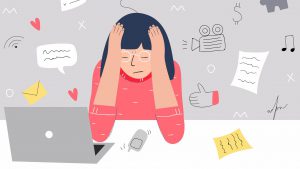We have all wondered at least once about how are we supposed to handle stress? Well, it is never a bad time to take help from an expert.

In this fast-moving life, all that we have been concentrating on lifestyle, social esteem, money, power, etc running overall this has made our life complicated that we tend to lose our mental health and stability.
And there’s also a trend evolving around that we easily blame a small mood swing as depression/stress and thus complicating and confusing ourselves about what mental health is, depression is.
WHAT IS STRESS THEN?
The term “stress” has been given varied meaning by people, its defined in terms of pressure, tension, unpleasant external forces, or an emotional response.
It has become a popular phenomenon that is spun in our daily conversation, alongside developing as a trend grabbing attention from different media forms.
The concept of stress involves biochemical, physiological, and psychological changes that a person undergoes in an environment.
There are different model that has been developed on stress, they are
- CANNON’S FIGHT OR FLIGHT MODE
- SELYE’S GENERAL ADAPTATION SYNDROME
- BOUNCE MODEL
- THE TRANSACTIONAL MODEL OF STRESS
- SELIGMAN’S THEORY OF LEARNED HELPLESSNESS.
Understanding the root is important before we address anything, the term “stress” has been approached in at least four different ways.
- As a stimulus or external force acting in the organism
- As a response or changes in the physiological functions
- As an interaction between external forces and resistance to it
- As a comprehensive phenomenon encompassing all the three.
There are different responses that our body unleashes when we are stressed which could be cognitive, emotional, behavioral, and hence their consequence. Few of these responses could be voluntary and few involuntary. That’s where sometimes we feel we have temper issues, that we feel low for no reason and all these could be involuntary responses to stress.
Also, there is a perception that confuses stress as a disease, it has no carriers such as germ or virus. It is rather the result of our mind and body function. Thereby, it’s the “dis-ease” of our mind and bodies that have different symptoms on distinct people.
It could lead to a heart attack, depression, alcoholism sometimes could be unrecognized and hence untreated.
Ways to handle stress
Moving on to the most popular area of stress, how to handle stress?
People tend to shy away from talking about their mental health issues when compared to physical diagnosis. They feel it would creepy and worried if they will be considered as an emotionally unstable person or could be considered with less emotional strength etc.
There are various popular ways to handle stress:
1. Seeking social support

It is always good to seek help from our fellow people whom we trust, its good to speak out of the issue that has caused this mental reaction and try rationally addressing the cause.
2.Giving time to yourself

A well emotionally stable person always gives his/her brain to process the stimulus and then responding, it’s well. So let’s give our self some time for our mind to process this. It’s okay to find your soul back in solace.
3.Journaling

It’s always good to have a diary when we undergo certain emotionally draining situations, try penning them down, that eases you from that issue, and certain times you’ll end up with suggestions from your self on how to your handle stress rationally.
4.Find a new hobby

There are many ways you find peace with yourself, it could be through any form of like planting, painting, cooking, etc. put your whole self into something and get your soul back with double shine.
5.Rearrange your space

Try adding new things to the place you live, add different colors to your room to feels freshened up. Add more warm colors like cool blue, sea green, yellow, etc. these colors have the natural tendencies of calming our mind
6.Read

Reading is always the finest habit that you can inculcate in your routine, it not only helps you to ease yourself from stress, but to remold yourself into a better person. Also, you can engage in intellectual conversations with peers.
7.Mindful eating

The food that you consume has a significant impact on your health. Be conscious of what you consume. Take count of nutrients rather than checking on your calories hit. Avoid overeating and under-eating. Consume adequate water. Avoid consuming caffeine.
8.Meditation and yoga

It’s the most popular and long term beneficial way of dealing with stress. Spending a few minutes on meditation and yoga would help you to restore your inner peace and calm. It helps you to control stress, decreases anxiety, improves cardiovascular health, and helps you to achieve greater mental health.
9.Sleeping pattern alignment

People tend to oversleep or suffer from lack of sleep due to stress. Try to realign your bad sleep cycle. Avoid taking short naps instead of stretch yourself in bed and try to get at least 7 hours of sleep straight. It’s a proven fact that people tend to develop stress due to bad sleeping cycle. Let us try aligning it the reverse for better. Good sleep any day over anything. A bad sleep cycle may cost you your mental health.
10. Consult a mental health specialist and try working on ways to get advice from the professional. They sure have the best way to ease you out.
All these are a few suggestive ways of dealing with the dis-ease. The most important of all this being able to speak out about this to our close ones. One must give up on the thought about the perception of others on their mental issue, at the end of the day, your perception will cost you your mental health.
Good food, music, travel are a few other ways to handle stress. Mediation is also another popular way of improvising mental health. To keep your mind happy, embrace the art of gratitude, and fall in love with every beautiful thing around you. Trust me, LIFE IS BEAUTIFUL! Believe in the magic called life.
HAPPY EASING!
To read more on Food & health, click here.
